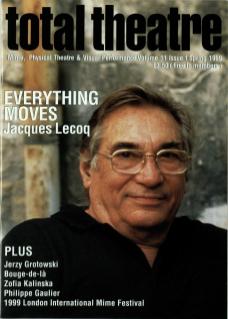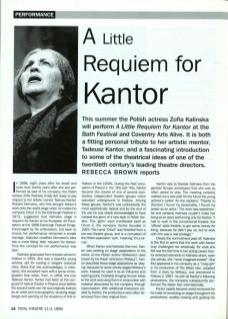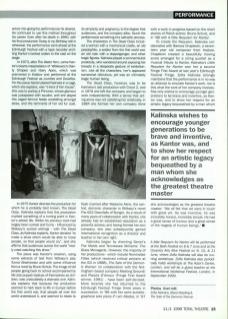In 1998, eight years after his death and more than twenty years after she last performed as part of his company, the Polish actress Zofia Kalinska finally felt ready to pay respect to her artistic mentor Tadeusz Kantor. Richard Demarco, who first brought Kantor's work onto the world stage when he invited his company Cricot 2 to the Edinburgh Festival in 1973, suggested that Kalinska stage a requiem for Kantor at his European Art Foundation at the 1998 Edinburgh Festival Fringe. Encouraged by his enthusiasm, but keen to ensure her performance remained a simple homage, Kalinska modified Demarco's idea into a more fitting ‘little' requiem for Kantor. Thus the concept for her performance was born.
Kalinska graduated from theatre school in Krakow in 1955. She was a beautiful young actress, apt for casting in elegant classical roles. Roles that she acknowledges, in retrospect, she accepted more with a sense of resignation than relish. Then, in 1958, she met Tadeusz Kantor. Kantor had been at the vanguard of radical theatre in Poland since before the Second World War. He was originally trained as an artist and scenographer, studying stage design and painting at the Academy of Arts in Krakow in the 1930s. During the Nazi occupation of Poland in the 30s and 40s, Kantor became the creator of one of several clandestine independent theatre groups which operated underground in Krakow. Among these groups, Kantor's was undoubtedly the most aesthetically radical and by the end of the war he was widely acknowledged to have created the germ of a new style in Polish theatre. This germ soon manifested itself as Cricot 2, the company Kantor founded in 1955. The name 'Cricot' was inherited from a pre-war theatre group, and is a corruption of the Polish expression 'cyrk', meaning ‘it's a circus’.
When Kantor and Kalinska first met, Kantor was working on stage adaptations of the works of the Polish author Witkiewicz (also known by his Polish nickname ‘Witkacy'). Kantor described these stage adaptations as 'playing’ because he never strictly staged Witkacy's work. Instead he used it as an influence and starting point; invariably bringing his own ideas to the work and using them in conjunction with material discovered by the company through improvisation. With additional characters created by Kantor, the productions were often far removed from their original form.
Kantor was to liberate Kalinska from the genteel female archetypes that she was so often asked to play. The meeting certainly marked out a new path for the future the young actress's career. As she explains: ‘Thanks to [Kantor] I found my personality, I found my power as an actor.’ The work was experimental and certainly Kalinska couldn't make her living as an actor performing only for Kantor: ‘I had to work in the conventional theatre, the official state theatre, to get some money for living because he didn't pay us; but to work with him was a real privilege.’
Clearly the commitment paid off. Kalinska is the first to admit that the work with Kantor truly challenged her artistically, for what she felt was the first time in her acting career. Kantor detected elements in Kalinska which, even she admits, she ‘never imagined existed’. She first appeared in his company as a ‘crazy girl’ in his production of The Water Hen, adapted from a story by Witkacy, and premiered in Krakow in 1967. As with all Kantor's following productions, the company subsequently performed The Water Hen internationally.
Kantor rapidly became world renowned for his habit of remaining on stage throughout his productions; audibly coaxing and guiding his actors into giving the performances he desired. He continued to use this method throughout his career. Even after his death in 1990, with his final production Today is my Birthday still in rehearsal, the performance went ahead at the Edinburgh Festival with a tape recorder emitting Kantor's barked orders to the cast on the stage.
In 1973, after The Water Hen, came Kantor's bizarre interpretation of Witkiewicz's Dainty Shapes and Hairy Apes, which was premiered in Krakow and performed at the Edinburgh Festival as Lovelies and Dowdies. For this piece Kantor placed Kalinska in a cage, which she explains, was ‘a kind of hen house’. She was to portray a Princess, whose glamour was juxtaposed with squalor, and she played this caged femme fatale scrabbling amongst straw, and the remnants of her old fur coat.
In 1975 Kantor directed the production for which he is probably best known, The Dead Class. Kalinska explains that this production marked something of a turning point in Kantor's artistic life. Whilst his previous work had largely been surreal and funny – influenced by Witkacy's surreal writings – with The Dead Class, as Kalinska explains, Kantor decided ‘to make a show which would be able to move people, so that people would cry’, and she affirms that audiences across the world ‘really cried watching this show’.
The piece was Kantor's creation, using some extracts of text from Witkacy's play Tumor Brainiowicz and with some influence from a novel by Bruno Schulz. The image of old people going back to school accompanied by life-size puppet replicas of themselves as children, was undoubtedly a dramatic one. Kalinska explains that because the production seemed to hark back to life in Europe before the First World War, that people all over the world understood it, and seemed to relate to its simplicity and poignancy; to the degree that audiences, and the company alike, found the performance something of a cathartic process.
The characters in The Dead Class included a woman with a mechanical cradle, an old paedophile, a soldier from the First World War, an old man with a doppelganger, and other tragic figures. Kalinska played a somnambulist prostitute, who wandered around exposing her breasts in a desperate gesture of exhibitionism. Like all the characters, hers appeared somewhat ridiculous, yet was an ultimately tragic human being
The Dead Class, however, was to be Kalinska's last production with Cricot 2, and in 1976 she left the company and began to work independently. With a sense that acting alone was not satisfying her artistically, in 1984 she formed her own company Akne Teatr (named after Madame Akne, the central, demonic character in Witkacy's novel The 622 Downfalls of Bungo). As a result of many years of collaboration with Kantor, she already had an established reputation as a powerful actress; and having formed her own company, she also subsequently gained international recognition as a director and teacher in her own right.
Kalinska wishes to encourage younger generations to be brave and inventive, as Kantor was, and to show her respect for an artistic legacy bequeathed by a man whom she acknowledges as the greatest theatre master
Kalinska began by directing Genet's The Maids and Tennessee Williams' The Glass Menagerie. However, the majority of her productions – which include Nominatae Filiae (which received critical acclaim at the ICA in 1988), The Sale of the Demonic Women (in collaboration with the Nottingham-based company Meeting Ground) and Plaisirs D'Amour (Fringe First Award winner, 1991) – have been self-devised. More recently she has returned to the Edinburgh Festival Fringe three years in succession. In 96 with her semi-autobiographical solo piece If I am Medea, in 97 with a work in progress based on the short stories of Polish author, Bruno Schulz, and in 98 with A Little Requiem for Kantor.
To create the Requiem, Kalinska collaborated with Bartosz Chajdecki, a seventeen year-old composer from Krakow. Chajdecki created a beautifully moving score arranged for a string quartet as a musical tribute to Kantor. Kalinska's Little Requiem for Kantor won her a second Fringe First Award at last year's Edinburgh Festival Fringe. Zofia Kalinska strongly maintains that the performance is in no way an attempt to emulate Kantor's work, nor is this what the work of her company involves. She only wishes to encourage younger generations to be brave and inventive, as Kantor was, and to show her respect for an artistic legacy bequeathed by a man whom she acknowledges as the greatest theatre master: ‘We all felt that we were in touch with great art. He was inventive, he was incredibly honest, incredibly simple. He had a great sense of humour and a great sense of the tragedy of human beings.’
A Little Requiem for Kantor will be performed at the Bath Festival on 6 & 7 June and at the Coventry Arts Alive Festival on 9, 10 & 11 June, where Zofia Kalinska will also be running workshops. Zofia Kalinska also periodically holds workshops at The Actor's Centre, London, and will be a guest teacher at the International Workshop Festival, London, in September 1999.


